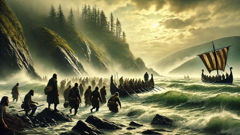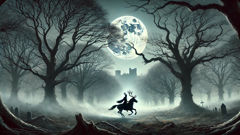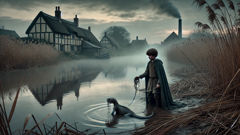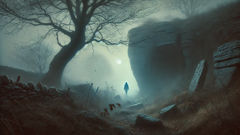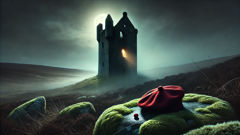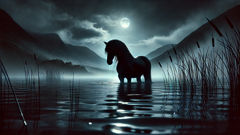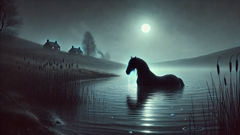Introduction
In the mist-veiled dawns of ancient Ireland, when the land was a patchwork of dense forests, wild rivers, and secret stone circles, legends say the world was young and every valley whispered with old magic. Long before the coming of the Tuatha Dé Danann and their gleaming hosts, before the Milesians sailed over the western horizon, there was a people whose story has nearly faded from memory: the Fir Bolg. Their tale begins not in the green embrace of Ireland, but across the restless sea, where exile and sorrow shaped them into a people both hardened and hopeful. Enslaved in distant lands, the Fir Bolg endured backbreaking labor and relentless suffering under the yoke of foreign kings. But where others bent, they forged resilience. With hearts still beating in time to Ireland’s ancient pulse, their dreams clung to the promise of a homeland lost to myth and longing. When their chains at last fell away, their journey home was as perilous as it was miraculous—a test of survival and unity across wild oceans and against all odds. Once ashore, they faced a land untamed, as beautiful as it was dangerous, and their destiny was to carve out a home where none would challenge their right to exist. Their rule, though fleeting in the great tapestry of time, left deep marks upon the soil and soul of Ireland. In their battles, their alliances, and their quiet moments of hope and sorrow, the Fir Bolg revealed the true measure of perseverance. Their legacy, entwined with legend and landscape, is not merely a record of who ruled first, but of the power of endurance, community, and courage in the face of unending change. Their story is Ireland’s hidden beginning—alive in every stone, echoing in every ancient oak.
From Chains to Freedom: The Exile of the Fir Bolg
Long before their feet touched Irish earth, the Fir Bolg were not rulers, but prisoners. Legends hold that their ancestors—scattered tribes of the Nemedians—had once claimed Ireland, only to be overthrown and scattered by invading Fomorians and cruel fortune. The survivors fled in desperate flight, some seeking shelter in far-off lands. Among these, a group found themselves stranded on the rocky shores of Greece, where their plight grew grim. Captured by powerful local kings, the exiles were condemned to a fate worse than war: a life of slavery spent hauling heavy bags of soil and stones up the steepest mountains. For generations, this toil shaped their bodies and their spirits. They became known as the ‘Men of the Bags’—the Fir Bolg—named for the burdens they bore day after day, year after year. Their backs bent but their hope never broke. In secret, around smoky fires beneath foreign stars, they passed on stories of Ireland: tales of green meadows where sunlight shimmered on dew; of rivers that sang through ancient woods; of dolmens standing sentinel on wind-swept hills. The memory of home became the single thread that held them together. Each generation grew up with the promise that, one day, they would return. When the yoke of their masters finally weakened—some say by uprising, others by quiet escape—the Fir Bolg seized their chance. Under the leadership of five brothers—Sláine, Rudraige, Gann, Genann, and Sengann—they gathered all who remembered the old songs and set their sights on the sea. The journey was treacherous. Their boats were little more than hollowed logs stitched with hope and desperation. Yet, guided by stars and the longing that had kept them alive for centuries, they braved tempests and hungry depths. Many boats were lost, but those who survived landed not as outcasts, but as pioneers, their hearts pounding with awe as they stepped onto the ancient soil.
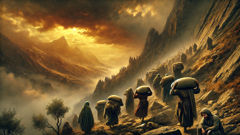
The moment their feet touched the sand, a hush fell across the land. The wild animals watched from the thickets; the rivers ran slower, as if to listen. Ireland, in those days, was still unclaimed—a realm of mist and legend waiting for a new beginning. The Fir Bolg knew hardship, but the earth itself seemed to greet them with open arms. They spread across the land, dividing it into five provinces to honor the five brothers who had led them home: Connacht, Leinster, Munster, Ulster, and Meath. Each brother became a chieftain, ruling his province with wisdom hard-won through suffering. For the first time in memory, the land had rulers who understood the value of freedom, unity, and perseverance.
Yet life in Ireland was no gentle dream. Dense forests hid wild boar and wolves. The rains could be cruel, and winter’s bite was sharp. The Fir Bolg built sturdy homes from stone and wattle, dug deep into the hills for shelter, and learned to read the seasons. They planted crops and herded cattle, marking each new harvest with firelit gatherings and ancient songs. They celebrated the land’s bounty and mourned its losses together, bound by more than blood—by a sense of purpose forged in exile.
In time, their society grew sophisticated. They forged iron tools and crafted intricate jewelry from gold pulled from riverbeds. Their druids held wisdom passed down through generations, interpreting omens and guiding the people with a deep respect for the forces that shaped the world. Above all, they honored the ancient stones—erecting standing circles and burial mounds to mark their place in history.
The Fir Bolg believed their suffering in Greece had taught them the balance between humility and pride. They ruled not as conquerors but as caretakers, guardians of a land that had called to them across centuries. Their leaders held regular councils at Tara, where disputes were settled not with sword but with speech. For a fleeting moment in the story of Ireland, there was peace—a peace built on shared hardship and common dreams.
A Kingdom of Five: The Rise and Reign of the Fir Bolg
Ireland, unbroken and untamed, blossomed under the rule of the Fir Bolg. With their five provinces established, each brother—Sláine, Rudraige, Gann, Genann, and Sengann—took up his crown. Sláine, eldest and wisest, was chosen as High King, ruling from the sacred hill of Tara, where the ancient Lia Fáil stone stood sentry over destiny itself. Their first challenge was unity. The land’s wildness tempted each chieftain to carve his own fate, but memories of exile reminded them of what division could cost. So, at Tara’s council, the five pledged fealty to each other, sharing both burdens and spoils. Their courts became places of law, hospitality, and celebration. Under their guidance, Ireland thrived. The forests yielded timber for houses and fires; the rivers brimmed with salmon; the plains rolled with herds of red cattle. Fields were sown with barley and flax, while wild bees provided honey for feasts. The Fir Bolg honored the old gods with offerings at sacred wells and honored the earth itself with festivals at each turning of the year—Imbolc for spring’s promise, Lughnasadh for the harvest, Samhain to honor the dead.
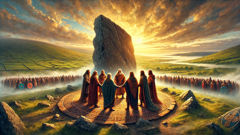
They were builders as much as warriors. Across the island, stone circles rose from green meadows. Burial mounds—some older than memory—became places of reverence where chieftains and wise women were laid to rest with weapons, torcs, and the stories of their lives. Every valley echoed with the clang of bronze and the laughter of children at play. Yet peace was never taken for granted. The Fir Bolg faced threats from wild animals and wandering bands who sought to challenge their rule. They trained warriors skilled with spear and sling, but their greatest weapon was unity—the hard-won trust between the five provinces. When storms battered the coast or famine threatened, they met at Tara to share what they had. No one province prospered while another suffered.
Among their greatest legacies was their sense of justice. The Brehon Laws—rules of conduct and reparation—ensured that disputes were resolved fairly. Women held important roles as druids, healers, and even warriors. Marriage, kinship, and land were sacred bonds. Slavery—so recently escaped—was not tolerated among their own. Stories tell of the poet Eithne, whose wisdom shaped many of the laws still whispered in later centuries.
But time, as always, moved on. The Fir Bolg knew their rule was fragile, that the land they had claimed with such effort might one day face new challenges. They watched the horizon for sails, listened for omens in birdflight, and kept alive the memory of suffering and endurance that had shaped them. Even as new generations grew up knowing only peace and plenty, the oldest among them remembered what it had cost.
In this era, myth and reality wove tightly together. The Fir Bolg honored the land’s spirits and guarded its mysteries, believing themselves not only rulers but stewards of a living story. Their presence left deep marks—on stone, in law, and in the hearts of all who called Ireland home.
The Arrival of the Tuatha Dé Danann: The Last Stand
Peace on any land is a fragile thing. Generations passed, and Ireland flourished under the careful rule of the Fir Bolg. Their children’s children had only ever known this home. But legends say that Ireland has always been a place where new peoples arrive from over the sea, and soon a fresh wave of destiny surged toward its shores. The Tuatha Dé Danann arrived from the sky, or so some stories say—mysterious, radiant, otherworldly beings, steeped in magic and wisdom beyond the knowledge of mortals. Their ships were sleek and strange, their weapons bright with enchantments, and their leaders—Nuada of the Silver Hand, the sorceress Danu, the wise physician Dian Cecht—bore gifts and powers that seemed touched by the gods themselves.
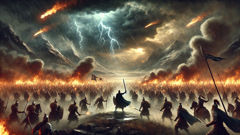
The Fir Bolg watched their approach with equal parts awe and dread. At first there was hope that peace could be brokered—that these newcomers might settle some wild corner of the land without bloodshed. Envoys were sent between camps: poets and priests speaking for each side, testing for common ground. Yet suspicion ran deep, and pride even deeper. The Tuatha Dé Danann, for all their grace, demanded half the island—an affront to those who had suffered so long for their home. The Fir Bolg refused. If the land was to be divided, it would be by right of arms.
So began the Battle of Mag Tuired, a clash that would echo in song and sorrow for millennia. The Fir Bolg gathered their warriors from every province. Old chieftains and young champions alike donned armor and painted their faces with symbols of protection. From Tara to the farthest coast, the call to arms swept the land. The Tuatha Dé Danann, meanwhile, set their standards on the plain: banners bright as dawn, shields that gleamed with silver runes. Their druids called up mists and illusions; their healers mended wounds as quickly as they were dealt.
The battle raged for days—fierce and unrelenting. Both sides fought with desperate courage. Stories say that three hundred heroes fell each day; that the rivers ran red and the sky was darkened by smoke and sorrow. At the center stood King Eochaid mac Eirc, High King of the Fir Bolg—descendant of Sláine—who fought not just for victory, but for the soul of his people. Though battered, the Fir Bolg never broke. They knew defeat could mean exile or extinction, but surrender was unthinkable. Even as their numbers dwindled, they held their lines with grim determination, trusting in the land that had once embraced them as exiles.
At last, with both armies nearly shattered, the Tuatha Dé Danann offered terms: honor for the defeated, safe passage or settlement for those who survived. The Fir Bolg accepted—not from weakness, but from wisdom. They had learned in exile that sometimes the greatest courage is knowing when to yield so that hope may live on. A remnant of the Fir Bolg was granted the province of Connacht, where their descendants would carry on their name and customs. The rest scattered or faded into legend, remembered as warriors who fought for every inch of their home.
In the end, it was not just a battle for land but for meaning: a test of whether endurance can outlast even the greatest magic. The Fir Bolg lost their crown, but not their spirit. Their legacy became part of Ireland itself—a reminder that every new beginning grows from an old struggle.
Conclusion
Though the Fir Bolg’s reign ended on the blood-soaked fields of Mag Tuired, their story didn’t simply fade into obscurity. In the centuries that followed, bards carried their memory from hearth to hearth, singing of courage born from suffering and unity kindled by hardship. Their descendants held fast to the western hills of Connacht, where local legends still whisper of hidden treasures and ancient wisdom beneath mossy stones. The laws they crafted and the boundaries they drew endured long after their rule—echoes in Ireland’s enduring sense of justice and community. In every gathering at Tara, every standing stone and sacred well, there lingers the spirit of those first exiles who shaped a nation out of longing and resolve. To remember the Fir Bolg is to remember that every land is a tapestry woven from many hands, and that even those who seem to vanish remain, in some mysterious way, part of the story forever.

